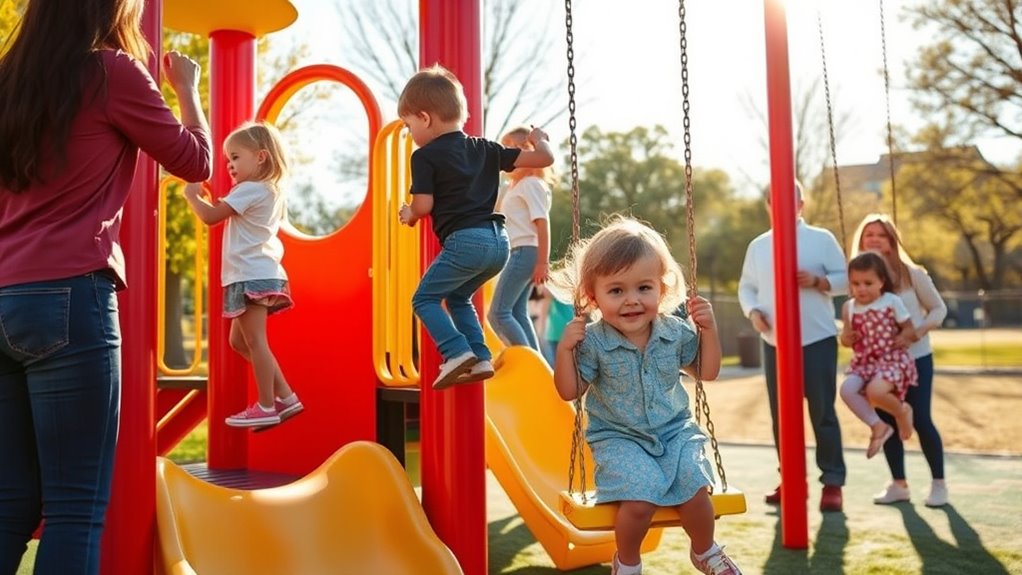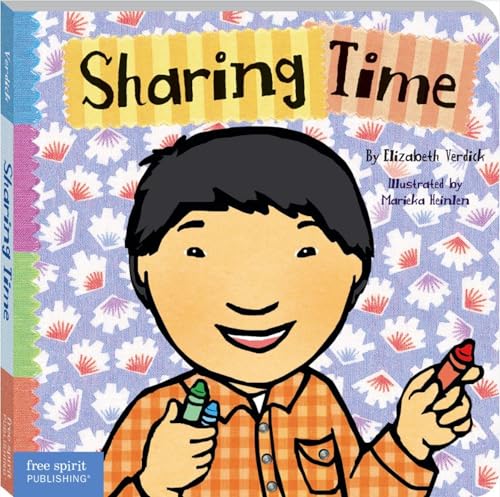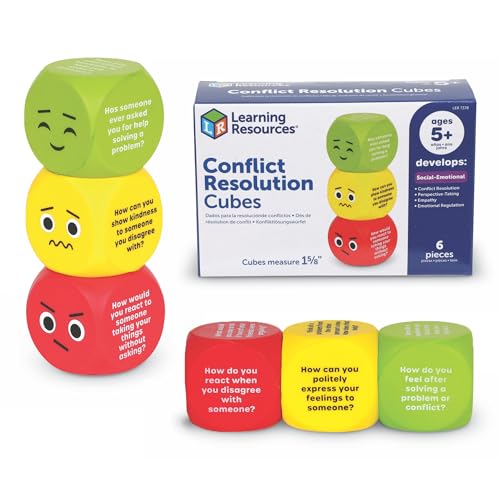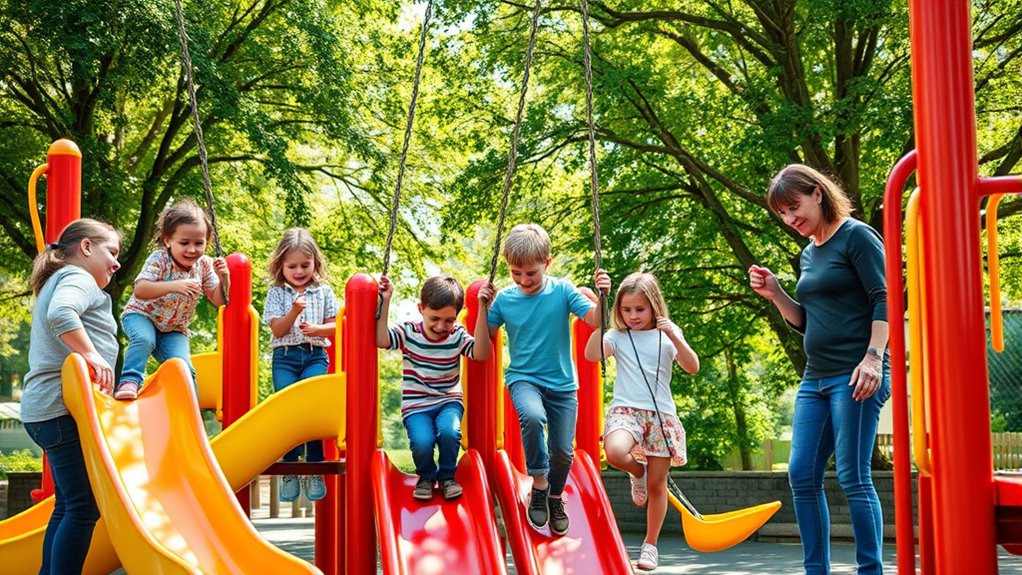As a parent, you should supervise your kids closely, especially younger ones, to keep them safe and teach respectful play. Promote sharing, patience, and polite requests like “Can I have a turn?” by modeling good manners yourself. Encourage fair turn-taking and calm conflict resolution without taking sides. Consistently remind children about playground etiquette to foster kindness and cooperation. If you want to make certain of a positive, safe environment, keep these tips in mind as you guide your kids through playtime.
Key Takeaways
- Supervise children closely, adjusting oversight based on age and abilities to ensure safety.
- Model respectful behavior, including sharing, polite requests, and patience during play.
- Encourage fair sharing and use turn-taking to promote cooperation among children.
- Teach children playground etiquette, such as respectful communication and respecting others’ space.
- Intervene calmly in conflicts, guiding children to express feelings and resolve disputes amicably.

When you visit the playground, practicing good etiquette helps everyone enjoy their time safely and happily. One of the most essential responsibilities you have as a parent or guardian is to follow supervision guidelines. Keeping a close eye on your children ensures they stay safe and behave appropriately. This means staying within sight and hearing range, so you can quickly intervene if someone is being unsafe or if a conflict arises. Proper supervision also involves understanding your child’s age and abilities, adjusting your level of oversight accordingly. Young children often need more direct supervision—they might not recognize hazards or know how to navigate equipment safely. Older kids, while more independent, still benefit from your presence, especially when it comes to managing sharing practices and resolving disputes. Being attentive doesn’t mean hovering constantly, but it does mean checking in regularly, offering guidance, and modeling respectful behavior. Additionally, teaching children about playground etiquette helps foster a respectful and cooperative environment for everyone. Sharing practices are vital for creating a positive playground environment. When you see children playing, encourage them to share toys, equipment, and space. Teach your kids that sharing is a way to be kind and considerate. If they’re reluctant to share, help them understand how sharing can make playtime more fun for everyone. For example, suggest taking turns or using a timer to ensure each child gets a fair chance to play with a favorite toy or piece of equipment. When conflicts over sharing happen, step in calmly and encourage kids to communicate their feelings and find solutions together. Avoid taking sides or forcing a resolution; instead, guide them toward understanding each other’s perspectives. Reinforcing polite requests, such as “Can I have a turn?” or “Would you like to play together?” fosters cooperative behavior. It’s also helpful to remind children that sometimes, patience and understanding are part of good playground manners. As a parent, setting an example by practicing sharing and respectful communication yourself teaches children by observation. Praise your kids when they demonstrate good sharing practices, reinforcing positive behavior.

MAEXFB Attention Playground for Children 12 & Under Adult Supervision Required Warning Tin Sign | Metal Style | 8×12 Inch | Home Business Playground | Child Decor
This vintage aluminum sign isn’t just decor—it delivers clear safety reminders while adding fun, one-of-a-kind personality to your…
As an affiliate, we earn on qualifying purchases.
As an affiliate, we earn on qualifying purchases.
Frequently Asked Questions
When Should I Step in During My Child’s Playtime Conflicts?
You should step in during your child’s playtime conflicts only when safety is at risk or the situation escalates beyond their ability to resolve. Your parental intervention is vital for guiding conflict resolution and teaching problem-solving skills. Avoid taking over entirely, and instead, encourage your child to express their feelings and work through disagreements. Stay nearby to support, but let them handle most of the conflict to foster independence.
How Do I Handle My Child’s Fear of Playground Equipment?
You can handle your child’s fear of playground equipment by using techniques for calming fears, like offering reassurance and gentle encouragement. Stay close, speak softly, and validate their feelings, showing understanding. Encourage bravery by celebrating small victories and gradually introducing new equipment at their pace. This helps build confidence and trust, making the playground a safe, fun environment where they feel supported and brave enough to try new things.
What Are Age-Appropriate Playground Activities for Different Children?
Think of playgrounds as a garden where each plant needs the right environment to thrive. For younger children, choose equipment with gentle slides, low swings, and soft surfaces to guarantee playground safety. Older kids can handle more challenging equipment like climbing structures and faster slides. Always select age-appropriate equipment, and supervise closely to keep play safe and fun, letting your child’s confidence grow with each new adventure.
How Can I Teach My Child About Sharing and Taking Turns?
You can teach your child about sharing and taking turns by modeling sharing strategies and turn-taking tips yourself. Encourage them to wait patiently and praise their efforts when they do. Use simple language, like “your turn comes next,” and create games that emphasize fairness. Reinforce positive behavior regularly, and remind your child that sharing makes playtime more fun for everyone. Consistent practice helps them develop these important social skills.
Are There Specific Rules for Supervising Children With Special Needs?
You should supervise children with special needs with patience, attentiveness, and flexibility. Focus on creating an inclusive play environment where every child feels safe and respected. Encourage sensory-friendly spaces that accommodate different needs, and stay vigilant for signs of discomfort or distress. Always communicate openly with your child and other caregivers, fostering understanding and support. Your attentive supervision helps ensure everyone can enjoy the playground safely and happily.

Sharing Time (Toddler Tools® Board Books)
Used Book in Good Condition
As an affiliate, we earn on qualifying purchases.
As an affiliate, we earn on qualifying purchases.
Conclusion
By following playground etiquette, you’re planting seeds of kindness and respect that blossom into joyful memories. Think of the playground as a shared garden, where everyone’s cooperation helps the fun grow wild and beautiful. When you and your kids practice good manners, you’re weaving a tapestry of trust and friendship that lasts beyond the swings and slides. Remember, a little courtesy turns an ordinary playdate into a vibrant masterpiece of community and connection.

gym dandy Spinning Teeter Totter – Impact Absorbing Kids Playground Equipment – 360 Degree Rotation, Red, Yellow & Blue, 99 Inch, (TT360)
Two-In-One Play Set – This Seesaw Can Rotate In Complete 360 Degree. Thanks To Its Urethane Wheels, Once…
As an affiliate, we earn on qualifying purchases.
As an affiliate, we earn on qualifying purchases.

Learning Resources Conflict Resolution Cubes – Conversation Starter Cubes, Therapy Games for Kids, Social Skills Cards, Social Emotional Learning Games, Table Questions for Family Dinner
LEARNING CONVERSATION CUBES: Kids roll colorful cubes and explore 30 prompts while building communication skills; perfect for conversation…
As an affiliate, we earn on qualifying purchases.
As an affiliate, we earn on qualifying purchases.









